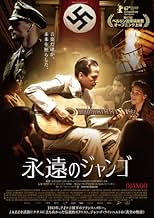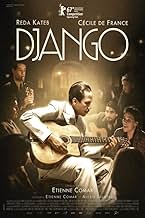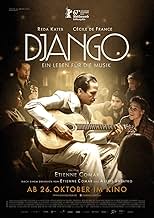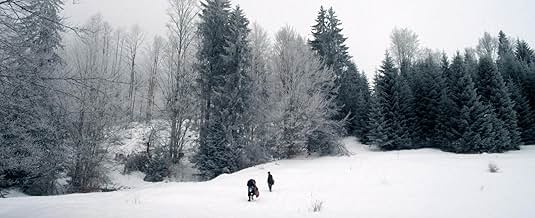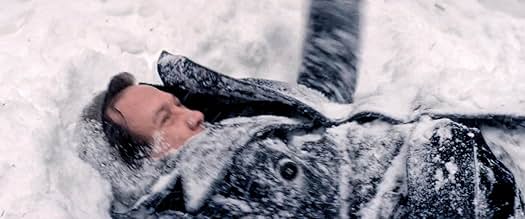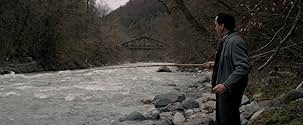CALIFICACIÓN DE IMDb
6.4/10
2.1 k
TU CALIFICACIÓN
La historia de Django Reinhardt, famoso guitarrista y compositor, y su huida del París ocupado por los alemanes en 1943.La historia de Django Reinhardt, famoso guitarrista y compositor, y su huida del París ocupado por los alemanes en 1943.La historia de Django Reinhardt, famoso guitarrista y compositor, y su huida del París ocupado por los alemanes en 1943.
- Dirección
- Guionistas
- Elenco
- Premios
- 5 nominaciones en total
Cécile de France
- Louise de Klerk
- (as Cécile De France)
Bea Palya
- Naguine Reinhardt
- (as Beata Palya)
Gabriel Mirété
- Lévêque
- (as Gabriel Mireté)
- …
Etienne Timbo Mehrstein
- Timbo Hoffman
- (as Etienne Mehrstein)
Opiniones destacadas
This film covers mostly 1943 as well as a bit in May, 1945 at the end. So, obviously this film is not Django Reinhardt's entire life story. It's a shame but I can certainly understand why they chose this path. If you want to know more about the man, check Wikipedia and go from there.
The film picks up in the middle of WWII. Django is a big star in Paris and is even loved by the occupying Nazis. What makes this so unusual is that he was one of the Romani (aka Gypseys) and they were hated and persecuted by the Reich. Additionally, he played swing...a style music associated with black Americans...a group also despised by the German government. Problems develop when the Nazis insist he do a tour of Germany and Django is worried he'll never return. So, they decide to make a run for it. The movie is all about this period of time.
The film is something I really appreciated because tons of films have been done about the Jewish Holocaust. These are excellent films but the Romani were also gassed in large numbers and I can't think of a single film that covers it other than this one. It makes for a sad viewing experience...but also a masterfully crafted one well worth your time.
The film picks up in the middle of WWII. Django is a big star in Paris and is even loved by the occupying Nazis. What makes this so unusual is that he was one of the Romani (aka Gypseys) and they were hated and persecuted by the Reich. Additionally, he played swing...a style music associated with black Americans...a group also despised by the German government. Problems develop when the Nazis insist he do a tour of Germany and Django is worried he'll never return. So, they decide to make a run for it. The movie is all about this period of time.
The film is something I really appreciated because tons of films have been done about the Jewish Holocaust. These are excellent films but the Romani were also gassed in large numbers and I can't think of a single film that covers it other than this one. It makes for a sad viewing experience...but also a masterfully crafted one well worth your time.
Solid biopic of a short period of Django's life during WWII. Acting OK, photography is very good, plot is OK but the music and the onscreen playing thereof is masterful.
Greetings again from the darkness. Don't mistake this for either the Franco Nero (1966) or Jamie Foxx (2012) movie. This latest from writer/director Etienne Comar centers on Django Reinhardt, one of the most talented and influential musicians of the twentieth century. Based on the novel "Folles de Django" by Alexis Salatko, the story follows the challenges of his escape from German-occupied France.
He is already a renowned (and enigmatic) performer when the film kicks off in 1943 Ardennes, as Django and his band are being contracted by the Nazis to tour and entertain the troops. Of course, he refuses to sign the contract and tour under their terms with limit the style of music he can play. Because of this, Django and his family must flee and disappear underground, while they plan an escape to Switzerland.
His musical influence proliferated the area, and his influence and respect is clear at each step of his travels. In fact, it's the musical pieces and segments that really stand out here. Reda Kateb (A PROPHET, 2009) gives a terrific and expressive performance as Django, but the musical portions are so outstanding, that we find ourselves not as engaged in the personal saga of escape as we should. Clearly, the war and Nazis are a threat, and when Django says "I'm a musician. It's what I do", that serves as his admission that he takes an apolitical stance and does not envision himself as a hero to the people.
As a driving force behind European jazz, and being such an influence on so many guitar players, Django's legacy is something other than as a war icon. The film certainly could have benefitted from more attention to either how his music gained popularity, or what drove him to avoid any political notoriety until it was too late for many of his fellow Gypsies. Admittedly, his escape was crucial and led to his 1945 score, "Requiem for Gypsy Brothers", of which his conducting leads to the most emotional moment of the film.
He is already a renowned (and enigmatic) performer when the film kicks off in 1943 Ardennes, as Django and his band are being contracted by the Nazis to tour and entertain the troops. Of course, he refuses to sign the contract and tour under their terms with limit the style of music he can play. Because of this, Django and his family must flee and disappear underground, while they plan an escape to Switzerland.
His musical influence proliferated the area, and his influence and respect is clear at each step of his travels. In fact, it's the musical pieces and segments that really stand out here. Reda Kateb (A PROPHET, 2009) gives a terrific and expressive performance as Django, but the musical portions are so outstanding, that we find ourselves not as engaged in the personal saga of escape as we should. Clearly, the war and Nazis are a threat, and when Django says "I'm a musician. It's what I do", that serves as his admission that he takes an apolitical stance and does not envision himself as a hero to the people.
As a driving force behind European jazz, and being such an influence on so many guitar players, Django's legacy is something other than as a war icon. The film certainly could have benefitted from more attention to either how his music gained popularity, or what drove him to avoid any political notoriety until it was too late for many of his fellow Gypsies. Admittedly, his escape was crucial and led to his 1945 score, "Requiem for Gypsy Brothers", of which his conducting leads to the most emotional moment of the film.
Too schematic and for non-French wiever also not 100% understandable ... German soldiers presented as too stupid.
World Premier at Berlin film festival, Feb. 9, 2017. Django Reinhardt was one of the most brilliant pioneers of European jazz and the father of Gypsy Swing. "Django" portrays one chapter in the musician's eventful life and is a gripping tale of survival. Constant danger, flight and the atrocities committed against his family could not make him stop playing.
Rarely is an opening festival film so compelling and overwhelming that you feel as if the festival ended right there the trip to Berlin would have been justified. Reda Kateb as Django Reinhardt the gypsy musician with the German sounding name, made me forget I was watching an actor playing a part but felt like I was watching the jazz legend Django himself back from the great beyond in the flesh, carefully trimmed Gable moustache and all. This film like last year's Jazz Legend Berlin biopic "Miles Ahead" (Miles Davis) assumes that the audience knows the personality in question well enough not to require any back story and plunges right into a certain segment of the life under scrutiny. In actual fact, while Three fingered guitarist Django Reinhardt was highly regarded by black American Jazzmen such as Duke Ellington, Ornette Coleman, et alia, because his name is mainly associated with the french "Le Hot" jazz scene of the thirties and forties, he is not as well known to the general American public as he should be. Django was simply a musical genius whose hot jazz quintet was the hottest band around in France and surrounding countries up to and including the German occupation years of WW II. This film focuses on two things: The incredible music of Django with half a dozen virtuoso foot stomping musical sequences, and (2) the persecution of Gypsies under Nazi racism. The musical sections show in great detail the fantastic guitar fingerings of the inimitable Django as well as his backup musicians, notably the clarinetist who was also jamtastic.
A German officer who is a great fan of Django's lines up a German tour for the Hot Quintet to entertain Nazi bigwigs in Germany. However there are restrictions that must be met supposedly removing all Black Jazz elements such as the Blues and certain percussion instruments deemed as racially impure by the Nazis. Django finally realizing that if he goes on the tour he will probably never return flees with his feisty mother and family south hoping to make it over the border to Switzerland and safety. Apprehended there he is forced to stage a concert for a group of high level Nazis at a luxurious lakeside villa, but the heat of Djangos hot jazz drives the Germans into a Frenzy and results in a riot. Django escapes in the confusion and survives the war. At the very end after France is liberated a Requiem he composed to honor the Exterminated Gypsies is played on a momentous church organ and Django's heroism is recognized. A final message on screen notifies us that all but the opening bars of Django's requiem were lost, but have been reconstructed by serious musicians to prove that Reinhardt was not only a virtuoso performer but a noteworthy composer as well. Magnificent, beyond words. Cécile de France was also captivating as Django's fictionalized Gadjo (Non-Gypsy) girlfriend who marries a Nazi to save her own life but risks it at the end to save Django, and the old woman who plays Django's mother is a scene stealer every time she appears. Director Étienne Comar has done both the film and music worlds a great service with this remarkable picture.
PS: By no means to be confused with Q. Tarantino's comic book entitled "Django Unchained" under penalty of death!
Rarely is an opening festival film so compelling and overwhelming that you feel as if the festival ended right there the trip to Berlin would have been justified. Reda Kateb as Django Reinhardt the gypsy musician with the German sounding name, made me forget I was watching an actor playing a part but felt like I was watching the jazz legend Django himself back from the great beyond in the flesh, carefully trimmed Gable moustache and all. This film like last year's Jazz Legend Berlin biopic "Miles Ahead" (Miles Davis) assumes that the audience knows the personality in question well enough not to require any back story and plunges right into a certain segment of the life under scrutiny. In actual fact, while Three fingered guitarist Django Reinhardt was highly regarded by black American Jazzmen such as Duke Ellington, Ornette Coleman, et alia, because his name is mainly associated with the french "Le Hot" jazz scene of the thirties and forties, he is not as well known to the general American public as he should be. Django was simply a musical genius whose hot jazz quintet was the hottest band around in France and surrounding countries up to and including the German occupation years of WW II. This film focuses on two things: The incredible music of Django with half a dozen virtuoso foot stomping musical sequences, and (2) the persecution of Gypsies under Nazi racism. The musical sections show in great detail the fantastic guitar fingerings of the inimitable Django as well as his backup musicians, notably the clarinetist who was also jamtastic.
A German officer who is a great fan of Django's lines up a German tour for the Hot Quintet to entertain Nazi bigwigs in Germany. However there are restrictions that must be met supposedly removing all Black Jazz elements such as the Blues and certain percussion instruments deemed as racially impure by the Nazis. Django finally realizing that if he goes on the tour he will probably never return flees with his feisty mother and family south hoping to make it over the border to Switzerland and safety. Apprehended there he is forced to stage a concert for a group of high level Nazis at a luxurious lakeside villa, but the heat of Djangos hot jazz drives the Germans into a Frenzy and results in a riot. Django escapes in the confusion and survives the war. At the very end after France is liberated a Requiem he composed to honor the Exterminated Gypsies is played on a momentous church organ and Django's heroism is recognized. A final message on screen notifies us that all but the opening bars of Django's requiem were lost, but have been reconstructed by serious musicians to prove that Reinhardt was not only a virtuoso performer but a noteworthy composer as well. Magnificent, beyond words. Cécile de France was also captivating as Django's fictionalized Gadjo (Non-Gypsy) girlfriend who marries a Nazi to save her own life but risks it at the end to save Django, and the old woman who plays Django's mother is a scene stealer every time she appears. Director Étienne Comar has done both the film and music worlds a great service with this remarkable picture.
PS: By no means to be confused with Q. Tarantino's comic book entitled "Django Unchained" under penalty of death!
¿Sabías que…?
- TriviaAll music played by the incredible Dutch Rosenberg Trio
- ConexionesFeatures Hoch der Lambeth Valk (1941)
- Bandas sonorasNuages
Music by Django Reinhardt
Selecciones populares
Inicia sesión para calificar y agrega a la lista de videos para obtener recomendaciones personalizadas
- How long is Django?Con tecnología de Alexa
Detalles
Taquilla
- Presupuesto
- EUR 8,804,249 (estimado)
- Total en EE. UU. y Canadá
- USD 56,556
- Fin de semana de estreno en EE. UU. y Canadá
- USD 11,722
- 7 ene 2018
- Total a nivel mundial
- USD 3,876,874
- Tiempo de ejecución1 hora 57 minutos
- Color
- Relación de aspecto
- 2.35 : 1
Contribuir a esta página
Sugiere una edición o agrega el contenido que falta

![Ver Bande-annonce [OV]](https://m.media-amazon.com/images/M/MV5BMDc0Zjk3YzgtYTBmZC00MDI5LTg1MjItZjBjMGEyMzI3ODc2XkEyXkFqcGdeQXRodW1ibmFpbC1pbml0aWFsaXplcg@@._V1_QL75_UX500_CR0)


